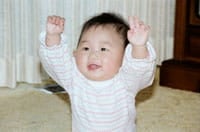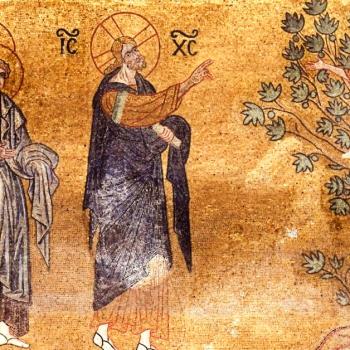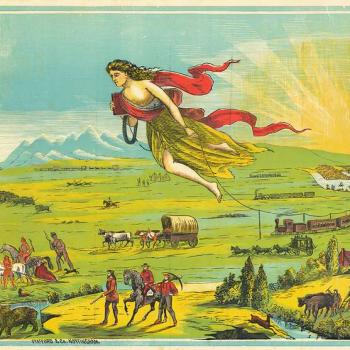Editor's Note: As the manager of the Evangelical Portal, I (Timothy Dalrymple) turned to adoption and orphan-care because I believed it formed an important part of the Christian response to abortion, which Patheos had discussed on the Public Square. Yet adoption is also a part of my family history, since my sister is adopted from Korea. Since I thought it might be helpful for families considering adoption to see the different perspectives within a single family, Galen Dalrymple reflected on adoption in "Surprised by (a Bundle of) Joy." Here his wife reflects on the same adoption.

By Laurel Dalrymple
Women were the major players in my mother's family. My mother's grandfather left his family to mine for gold in the northwest, leaving her grandmother alone in Colorado to raise four daughters. They survived because they worked together; the older girls left school to go to work. Then my grandmother and her elder sister married brothers and moved together to California, bringing their mother and sisters with them.
The women in my family were strong, pioneering women. I admired them. The bonds between them, and between one generation and the next, were deep. I could not imagine my own family without a little girl in it. I could not imagine living my entire life without a mother-daughter relationship with a daughter of my own. Our two sons were more than wonderful, and the bonds I developed with them were deep and earth-moving. Yet it was not the same.
When I first saw the picture of our daughter, given us by the adoption agency, I could not answer questions. I was barely aware of what was happening in the room. All I could think was this is my daughter, over and over again, and each time a different word sunk into my consciousness. THIS is my daughter...this IS my daughter...this is MY daughter...this is my DAUGHTER. I memorized her every feature. I imagined what she was thinking and feeling at that moment. In the months when we awaited her arrival, I had all the non-physical symptoms of pregnancy. I dreamt about her at night, and daydreamed about her by day. I prayed, shopped, and got everything ready, nesting in the only way I knew how.
I know the feeling you have when your newborn is placed in your arms -- and that's exactly what I felt when I first held her. I had prepared meals ahead of time so that we could spend every minute of our first week together. When we saw the pediatrician after a week, and she announced, "You and she have bonded already," I was so happy and proud.
Our daughter is Korean, so we don't look alike. I got tired of the comments and questions. When we were in the grocery store together she got so used to people asking if she was adopted that she started answering the question before it was asked. Once when I was babysitting a neighbor's Caucasian baby, I thought his color was so pale and pasty and his face so bumpy. I realized that I was seeing him from a new perspective. My daughter was so beautiful in my eyes that she became the norm for how babies ought to look. When I looked at her, I didn't see her as any race. I simply saw my daughter, in all her beauty and personality.
My husband and I wanted very much for our daughter to be proud of her race and heritage. We were proud of it ourselves, proud to be connected with such an ancient and incredible history. We learned about a week-long summer camp for Korean adoptees run by Koreans and staffed by college kids who wanted to pass on their heritage to adopted children. They were great young role models. Besides the good experience of being with and talking to other children adopted from Korea, the kids learned Korean language, culture, history, art, and even cooking. One of the best things we did in her childhood was sending her to KIM (Korean Identity Matters) camp.
If I could change one thing, it is this: I so badly wanted to make up for the fact that her birth mother had given her up (even though it was the most loving thing to do in her situation) that I tried too hard to keep my daughter from feeling any lack. I wanted to protect her from any more pain. So I was too overbearing; in some ways I was too easy on her, and in other ways I identified with her too much. Looking back, I believe that I kept her from being more open to me because she didn't want me to feel pain. This is a common over-compensation in adoptive mothers. The fact is that our adoptive children will have a hole in them that we, as parents, cannot fill. We have to accept that and let God work it out.
My daughter is still my heart, my joy, my blessing. I love being with her and sharing woman-stuff. She is a strong, loving, loyal, and courageous woman; a bright and shining star in my life. Now she has her own daughter and the line has gone on. To see your daughter become a mother (especially such a good one) is an incredible blessing. To see your adoptive daughter have a child of her own and see motherhood fill the hole inside her, and complete her, is a joy beyond expressing.
Laurel Dalrymple lives in Cloverdale, California.
This article appears as part of a series on orphans and adoption. Please also see :"Orphan Stories," "Surprised by (a Bundle of) Joy," "On Fathering a Daughter," and "God's Care for the Orphan: An Interview with Jedd Medefind."
8/26/2009 4:00:00 AM




